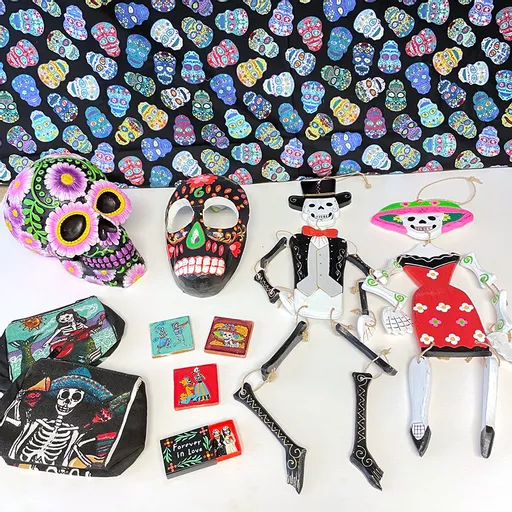Day of the Dead – A Colourful Celebration of Life and Remembrance
Introduction for Teachers
Each year, from 31st October to 2nd November, people across Mexico and beyond celebrate Día de los Muertos — the Day of the Dead. This vibrant festival is a wonderful way to introduce children to how different cultures remember and honour those who have died. It’s full of colour, creativity, and joy — and provides lots of opportunities for art, storytelling, and cultural learning in the classroom.
What is the Day of the Dead?
The Day of the Dead (in Spanish, Día de los Muertos) is a time when families remember their loved ones who have passed away. Rather than being a sad occasion, it’s a joyful celebration of life. Families share happy memories, music, and food, and decorate their homes with bright colours to welcome the spirits of those they love.
Where is it Celebrated?
The Day of the Dead is most famously celebrated in Mexico, but similar traditions are also found in other parts of Latin America, and even in Mexican communities around the world, including the United States. It’s such a special celebration that it’s recognised by UNESCO as part of the world’s Intangible Cultural Heritage.
When is the Day of the Dead?
The celebrations take place on 1st and 2nd November each year.
-
1st November is known as Día de los Angelitos (Day of the Little Angels) and remembers children who have died.
-
2nd November is Día de los Muertos, when adults are remembered and celebrated.
Although the dates are close to Halloween, the two are quite different – Día de los Muertos focuses on love, remembrance, and life rather than fright or fear.
The History of the Day of the Dead
This colourful festival has its roots in the Aztec civilisation, long before Spanish explorers arrived in the 1500s. The Aztecs believed that death was just another stage in life’s journey. When Spanish and Catholic traditions mixed with these ancient beliefs, a new kind of celebration was born — one that combines old and new customs into the unique Day of the Dead that people enjoy today.
How Do People Celebrate the Day of the Dead?
Families prepare altars, called ofrendas, to welcome the spirits of their loved ones. These are decorated with photos, candles, flowers, and favourite foods of the people being remembered.
Many families also visit cemeteries to clean and decorate graves, often spending the night there together. They share food, tell stories, and listen to music — turning the occasion into a lively and loving celebration.




Decorations and Symbols
The Day of the Dead is one of the most visually striking celebrations in the world!
Here are some of its most famous decorations and their meanings:
-
Marigolds (Cempasúchil): Bright orange and yellow flowers that are believed to guide spirits back to the world of the living with their scent and colour.
-
Sugar Skulls (Calaveras): Colourful, sweet skulls made of sugar or chocolate, often decorated with icing and patterns.
-
Paper Decorations (Papel Picado): Beautiful paper banners with cut-out designs that flutter in the wind to represent the fragility of life.
-
Skeletons (Calacas): Often dressed in fun, lively clothes and shown dancing or playing music — reminding everyone that death is not something to be feared, but a part of life’s cycle.
A Celebration of Life
The Day of the Dead is a beautiful way to help children understand that remembering those who have passed can be filled with joy, not sadness. It’s a celebration of love, memory, and the beauty of life.




For the Classroom
Teachers can use the Day of the Dead to explore art, history, geography, and culture. Activities could include:
-
Making colourful papel picado paper banners
-
Designing paper sugar skulls
-
Learning simple Spanish words related to the celebration
-
Talking about how families remember loved ones in different cultures
Starbeck Education
At Starbeck Education, we love helping children connect with world cultures and traditions through artefacts and hands-on learning. Celebrations like the Day of the Dead remind us that every culture has its own beautiful way of honouring life and memory.

















